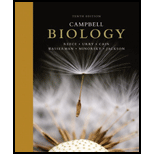
Campbell Biology (10th Edition)
10th Edition
ISBN: 9780321775658
Author: Jane B. Reece, Lisa A. Urry, Michael L. Cain, Steven A. Wasserman, Peter V. Minorsky, Robert B. Jackson
Publisher: PEARSON
expand_more
expand_more
format_list_bulleted
Concept explainers
Textbook Question
Chapter 1, Problem 11TYU
DRAW IT With rough sketches, draw a biological hierarchy similar to the one in Figure 1.3 but using a coral reef as the ecosystem, a fish as the organism, its stomach as the organ, and DNA as the molecule. Include all levels in the hierarchy.
Expert Solution & Answer
Want to see the full answer?
Check out a sample textbook solution
Students have asked these similar questions
What are biofertilizers and mention the significance
PCBs and River Otters: Otters in Washington State’s Green-Duwamish River have high levels of polychlorinated biphenyls (PCBs) in their livers. PCBs can bind to the estrogen receptors in animals and disrupt the endocrine system of these otters. The PCBs seem to increase the estrogen to androgen ratio, skewing the ratio toward too much estrogen.
How would increased estrogen affect the river otter population?
Based on your reading of the materials in this unit, what factors can affect fertility in humans?
Explain how each of the factors affecting human fertility that you described can disrupt the human endocrine system to affect reproduction.
Other than oil and alcohol, are there other liquids you could compare to water (that are liquid at room temperature)?
How is water unique compared to these other liquids?
What follow-up experiment would you like to do, and how would you relate it to your life?
Chapter 1 Solutions
Campbell Biology (10th Edition)
Ch. 1.1 - Starting with the molecular level in Figure 1.3,...Ch. 1.1 - Identify the theme or themes exemplified by (a)...Ch. 1.1 - WHAT IF? For each theme discussed in this...Ch. 1.2 - Prob. 1CCCh. 1.2 - Explain why "editing" is a metaphor for how...Ch. 1.2 - DRAW IT The three domains you learned about in...Ch. 1.3 - Contrast inductive reasoning with deductive...Ch. 1.3 - Prob. 2CCCh. 1.3 - Why is natural selection called a theory?Ch. 1.3 - WHAT IF? In the deserts of New Mexico, the soils...
Ch. 1.4 - How does science differ from technology?Ch. 1.4 - MAKE CONNECTIONS The gene that causes sickle-cell...Ch. 1 - Prob. 1.1CRCh. 1 - Prob. 1.2CRCh. 1 - What are the roles of gathering and interpreting...Ch. 1 - Explain why different approaches and diverse...Ch. 1 - Prob. 1TYUCh. 1 - Prob. 2TYUCh. 1 - Prob. 3TYUCh. 1 - Prob. 4TYUCh. 1 - Prob. 5TYUCh. 1 - Which of the following best demonstrates the unity...Ch. 1 - Prob. 7TYUCh. 1 - Which of the following statements best...Ch. 1 - Which of the following is an example of...Ch. 1 - Which sentence best describes the logic of...Ch. 1 - DRAW IT With rough sketches, draw a biological...Ch. 1 - EVOLUTION CONNECTION A typical prokaryotic cell...Ch. 1 - SCIENTIFIC INQUIRY Based an the results of the...Ch. 1 - WRITE ABOUT A THEME: EVOLUTION In a Short essay...Ch. 1 - SYNTHESIZE YOUR KNOWLEDGE Can you pick out the...
Additional Science Textbook Solutions
Find more solutions based on key concepts
An aluminum calorimeter with a mass of 100 g contains 250 g of water. The calorimeter and water are in thermal ...
Physics for Scientists and Engineers
1. Rub your hands together vigorously. What happens? Discuss the energy transfers and transformations that take...
College Physics: A Strategic Approach (3rd Edition)
What is the pH range for acidic solutions? For basic solutions?
EBK INTRODUCTION TO CHEMISTRY
Single penny tossed 20 times and counting heads and tails: Probability (prediction): _______/20 heads ________/...
Laboratory Manual For Human Anatomy & Physiology
How does the removal of hydrogen atoms from nutrient molecules result in a loss of energy from the nutrient mol...
SEELEY'S ANATOMY+PHYSIOLOGY
An obese 55-year-old woman consults her physician about minor chest pains during exercise. Explain the physicia...
Biology: Life on Earth with Physiology (11th Edition)
Knowledge Booster
Learn more about
Need a deep-dive on the concept behind this application? Look no further. Learn more about this topic, biology and related others by exploring similar questions and additional content below.Similar questions
- Selection of Traits What adaptations do scavengers have for locating and feeding on prey? What adaptations do predators have for capturing and consuming prey?arrow_forwardCompetition Between Species What natural processes limit populations from growing too large? What are some resources organisms can compete over in their natural habitat?arrow_forwardSpecies Interactions Explain how predators, prey and scavengers interact. Explain whether predators and scavengers are necessary or beneficial for an ecosystem.arrow_forward
- magine that you are conducting research on fruit type and seed dispersal. You submitted a paper to a peer-reviewed journal that addresses the factors that impact fruit type and seed dispersal mechanisms in plants of Central America. The editor of the journal communicates that your paper may be published if you make ‘minor revisions’ to the document. Describe two characteristics that you would expect in seeds that are dispersed by the wind. Contrast this with what you would expect for seeds that are gathered, buried or eaten by animals, and explain why they are different. (Editor’s note: Providing this information in your discussion will help readers to consider the significance of the research).arrow_forwardWhat is the difference between Uniporters, Symporters and Antiporters? Which of these are examples of active transport?arrow_forwardWhat are coupled transporters?arrow_forward
- How do histamine and prostaglandins help in the mobilization of leukocytes to an injury site? What are chemotactic factors? How do they affect inflammation process?arrow_forwardCompare and contrast neutrophils and macrophages. Describe two ways they are different and two ways they are similar.arrow_forwardDescribe the effects of three cytokines (not involved in the initial inflammation response). What cells release them?arrow_forward
arrow_back_ios
SEE MORE QUESTIONS
arrow_forward_ios
Recommended textbooks for you
 Biology 2eBiologyISBN:9781947172517Author:Matthew Douglas, Jung Choi, Mary Ann ClarkPublisher:OpenStax
Biology 2eBiologyISBN:9781947172517Author:Matthew Douglas, Jung Choi, Mary Ann ClarkPublisher:OpenStax

Biology 2e
Biology
ISBN:9781947172517
Author:Matthew Douglas, Jung Choi, Mary Ann Clark
Publisher:OpenStax
6 Microbes Saving the Environment; Author: SciShow;https://www.youtube.com/watch?v=hoiwllrRW34;License: Standard Youtube License